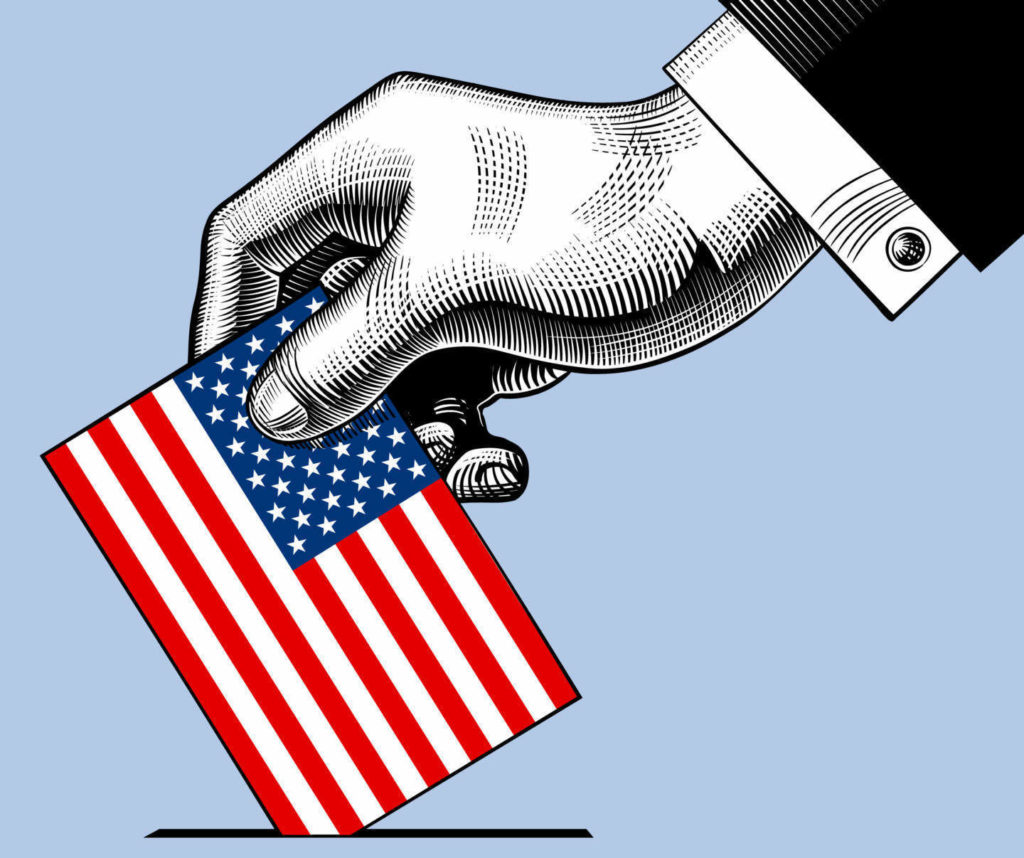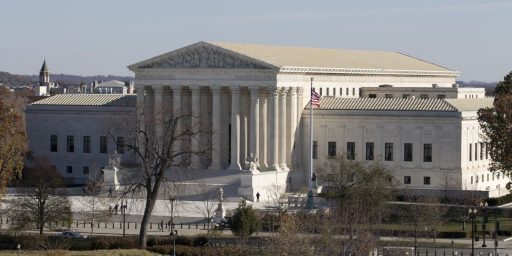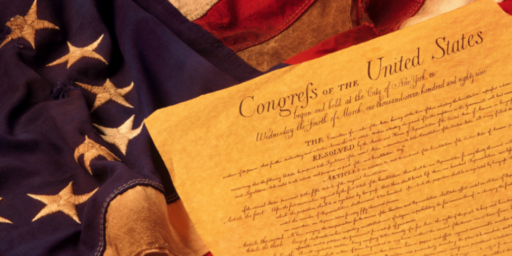How to Defend Rules Designed to Make Voting Harder
An example from Dan McLaughlin of NR

There are going to be any number of defenses of Georgia’s HB 202, most likely highlighting specific passages and talking about them in the abstract, often under ideal hypothetical circumstances. They will also ignore both the intent of the bill and the actual net result. The goal will be to make it all sounds perfectly reasonable and no big deal. An example of this genre is a piece in National Review by Dan McLaughlin: Joe Biden Botches the Georgia Voting Law.
The botch in question is based on this:
Now, I will be straightforward, while one might quibble over the word “atrocity,” I agree with Biden’s thesis: the goal here is to make voting more difficult. Moreover, the practice in question is associated with Black groups and so has partisan and racial implications. And from a political point of view, this is the kind of thing people will understand, as opposed to other, more esoteric/bureaucratic elements. Indeed, it may be the part of the bill that GA Republicans come to regret because it is so relatable and sound-biteable. So, far from a botch, this strikes me as smart politics/rhetoric.
But that really isn’t my main point here. My point is that McLaughlin engages in a kind of argumentation that I think will be a staple of those arguing in favor of this bill and others like it (I caught a glimpse of an FNC graphic doing something similar yesterday evening). The approach will be to isolate an element of the bill and talk about how it really isn’t that big of a deal and that, in fact, it will have no effect at all.
Here we go:
Let’s take a look at what S.B. 202 actually says:
“No person shall solicit votes [or] distribute or display any campaign material, nor shall any person give, offer to give, or participate in the giving of any money or gifts, including, but not limited to, food and drink, to [a voter] … This Code section shall not be construed to prohibit a poll officer…from making available self-service water from an unattended receptacle to [a voter] waiting in line to vote.”
The parts in bold are what S.B. 202 added to the statute. The prohibition applies inside polling places, within 150 feet of a polling place, or “within 25 feet of any voter standing in line to vote at any polling place.”
Let’s start here:
Now, first of all, notice what is not prohibited here. Voters can still bring bottled water or other food or beverages with them to stand on line to vote, as people often do when waiting at Disney World or to buy concert tickets or in other public places where people stand on long lines. Voters can still also, if they like, order food; the bill doesn’t stop the Domino’s Pizza man or the local hot dog cart or taco truck from doing business.
First, I am sure some people do bring food and water to the polls in anticipation of a long wait. But all of this, including specious comparisons to Disney World lines and pizza delivery scenarios, is ignoring the fundamental fact that one ought not to have to plan for such things when going to vote. Voting should not require the same kind of planning needed for an all-day trip to an amusement park. To suggest that voting might actually require that level of planning should not lead one to say, “so make sure you bring plenty of fluids,” but rather, “what can we do to eliminate those kinds of lines?”
McLaughlin continues:
And if you feel impelled to donate food and drink to voters, you can still do that, too; you just have to give it to the poll workers so they can put it out for general use.
I am guessing (actually, no I am not) that poll workers have enough to do than be distributors of water bottles. Plus, if the voters in line are close enough to the poll workers to get bottles of water from them, then they are about to vote and don’t likely need hydration at that point.
The president’s claim that “You can’t provide water for people about to vote” is just false. What you cannot do under the new Georgia law is deploy people in National Rifle Association t-shirts and MAGA hats to hand out free Koch-brothers-financed, Federalist Society-branded pizza to voters.
Look, as I noted in a previous post, I understand that there are legitimate reasons to want to curtail electioneering near polling place, especially in terms of giving out goodies in line. However, there are ways to write the law that would allow fo the distribution of very basic items, like water. The rules could also dictate whether persons handing out such items were allowed to be branded in some way. But since there are states (mine included) wherein voter guides and other items can be distributed at a certain distance from the actual polling place, I see no logical reason such rules couldn’t apply to “line warming.”
Setting aside the degree to which a person willing to stand in line for hours is likely to change their vote because someone in a MAGA hat gave them a bottle of water, there is a clear middle ground to be had here about how these practices could be regulated.
Note, also, that the law already forbade the display or distribution of campaign material, so this is a distraction.
In other words, this entire controversy is not about people dropping dead of hunger and thirst on long voting lines at all. It’s about electioneering around the polling place by people looking to advertise that they represent a cause, and who try to influence voters by giving them free stuff. Across the country today, we already have lots of laws against this sort of thing. There is nothing wrong with Georgia trying to limit it.
No, this entire controversy is about not having enough polling places and the commensurate long lines that are created. It is about a process that could be done easily and quickly taking hours out of a person’s day. And, specifically, it is about these burdens falling on the back of Black voters.
Indeed, why is this regulation being installed? Is it targeting some statewide malicious practice that needs to legitimately be curtailed in the public interest, or is it a practice linked heavily with Black activists and churches?
Are long lines and line warming via water bottles, snacks, and bubbles the kids a nonpartisan issue, or is this about targeting specific voters?
Does the regulation lead to true increases in fairness and freedom fo elections or is the hope that it will disproportionately effect Black voters? And beyond the hopes, what are the facts?
For some background, see this NPR pieces: Why Do Nonwhite Georgia Voters Have To Wait In Line For Hours? Too Few Polling Places.
Since the U.S. Supreme Court’s Shelby v. Holder decision in 2013 eliminated key federal oversight of election decisions in states with histories of discrimination, Georgia’s voter rolls have grown by nearly 2 million people, yet polling locations have been cut statewide by nearly 10%, according to an analysis of state and local records by Georgia Public Broadcasting and ProPublica. Much of the growth has been fueled by younger, nonwhite voters, especially in nine metro Atlanta counties, where four out of five new voters were nonwhite, according to the Georgia secretary of state’s office.
The metro Atlanta area has been hit particularly hard. The nine counties — Fulton, Gwinnett, Forsyth, DeKalb, Cobb, Hall, Cherokee, Henry and Clayton — have nearly half of the state’s active voters but only 38% of the polling places, according to the analysis.
If the George legislature really wants to stop line warming, then they need to guarantee more polling places. (THe word “guarantee” is key in that sentence).
McLaughlin acknowledges all of this, to a degree:
Is there a problem with voters standing on long lines to vote? Yes, there is, and it tends to fall more heavily on black voters. But unfortunately, in states such as Georgia, the problem of long lines is largely under the control of local Democratic officials rather than the Republicans who run the state, who nonetheless get all the blame from the national media.
While you would not learn this from the Democrats or their sympathetic media coverage, S.B. 202 actually takes steps to fix those long lines. Georgia law previously allowed the state to override local election officials and require them to add more precincts or voting machines if people were left standing on line for an hour after the polls closed. S.B. 202 expands that authority, so that the state can step in and require more` polling places or voting machines if voters in overcrowded precincts face lines of an hour or more at any of three measured intervals during the day. Read the new section for yourself:
“If, at the previous general election, a precinct contained more than 2,000 electors and if [voters] desiring to vote on the day of the election had to wait in line for more than one hour before checking in to vote, the superintendent shall either reduce the size of such precinct so that it shall contain not more than 2,000 electors…or provide additional voting equipment or poll workers, or both, before the next general election….The chief manager of a precinct which contained more than 2,000 electors at the previous general election shall submit a report thereof to the superintendent of the reported time from entering the line to checking in to vote. Such wait time shall be measured no fewer than three different times throughout the day (in the morning, at midday, and prior to the close of polls) and such results shall be recorded on a form provided by the Secretary of State.”
This is the right direction: Instead of allowing electioneering while people wait on long lines, eliminate both the electioneering and the lines. That’s what Joe Biden’s ranting is supposed to distract you from hearing.
The notion that Democrats want long lines for their own voters is absurd on its face. More importantly, the provisions provided in the bolder portion above are not adequate, because they are not proactive, but rather reactive. That is, there is no attempt here to figure out ahead of time when polling places need to be improved, but rather improvements only initiated after a problem. In other words, if in election X there is a lot of waiting, that could have the effect of suppressing voting in election X, and could also suppress voting in X+2 (since the waiting for X was so bad). Of course, if turnout is lower for X-2, that might motivate fewer polling places for X+4. Lather, rinse, and repeat.
If the goal was truly to limit waits at the polls, then the law should require assessing polling place needs based on known populations or look to more vote-by-mail options.
Also, a question for which I do not have an answer: where does the funding come from for the increase voting equipment mentioned in the bolded provisions above? This is no small question, especially for poorer counties. It is one thing to say state law provided for more precincts and equipment, it is another to ask if the state will provide the needed funding.
If the state GOP really wants shorter lines, it needs to provide the funding for more polling locations and polling equipment.
The bottom line of all of this needs to remain not, “is it possible that this or that change in the law could be considered reasonable?” But, rather, it should be: “does this change in the law net a benefit to electoral quality that outweighs the cost to citizen access to democracy?” Some rules clearly are needed to make sure that the process is legitimate, free, and fair. But if the net result is a marginal, perhaps even imperceptible, increase in quality to the potential detriment of actual voters, then the rule is not a good rule.
The standard should simply be: how much concrete quality is being bought at the price of access to a fundamental right? If that cost is not accounted for, then all the “reasonable” attempts at explaining these new laws amount to nothing.
To return to the McLaughlin piece, it problematic to try and act like this is just about electioneering, and therefore is reasonable, or that the law does have some provisions that could lead to more polling places in the future. Taken in a vacuum, these provisions may, in fact, appear reasonable. But laws aren’t made in a vacuum. These provisions, and the others I described yesterday, are part of a broader context and to pretend otherwise is either to miss the point of criticism in the first place or to be actively trying to dissuade people from understanding the context of the criticisms.
Any law should be judged not just on its hypothetical impacts on an antiseptic, neutral unreality, but on how it actually works in practice and in a specific context. And anyone who thinks that the context of voting in Georgia doesn’t have to take into account effects based on race is either ignorant, in denial, or being dishonest.






Oddly, having lived and voted in more states than most folks, I’m actually shocked by the degree to which electioneering near polling places is permitted pretty much everywhere. As you mention, people are handing out party-affiliated voter lists right near the entrance to the facilities. (Most prohibitions are meaningless, something like “within 150 feet.”) So it’s really hard to see some sort of harm that’s being prevented here.
Likewise, I’m amenable to the argument that there is voter fraud. I’m honestly surprised that there isn’t more of it, although with absentee and other remote voting rather than in-person, where the risk-reward calculus is absurdly weighted toward the former. But, despite years of vociferous claims, there’s essentially no evidence that meaningful fraud exists.
There are always well paid apologists or useful idiots that will go to great lengths to earnestly offer up nonsense reasons for the indefensible. For generations Republicans have trotted out an endless procession of reasons why Ronald Reagan kicked off his campaign with a speech, about how the federal government should let states run things the way they thought best, in Philadelphia, MS, most notorious for the torture and murder of young civil rights workers and the ensuing state and local government cover up for those crimes. Of course it couldn’t be so as to appeal to racists! Racism is a a thing of the past! Republicans have no more association with racism then the Dems or anyone else!
The water thing was just such a cruel mistake. These state-level Republicans are living in a fantasy world where nobody has noticed Trump or the GOP’s hostility to non-GOP votes. They are going to get torn apart because they made it illegal to give voters lined up for hours water. Water. Imagine the type of person who gets paranoid about water being given to voters waiting to vote. That’s the GOP. An old white maid with no friends staring out of her window ready to call 911 at her black neighbor taking out the trash. That’s the message they sent with this bill and the scrubs–Baseball Crank, a hack’s hack–are trying to do some damage control.
This stuff is going to backfire so bad.
As we went through last year and on into this year, I have never been so happy to live in a vote by mail state. Send a ballot to all the registered voters that they can mail back or use one of the many drop boxes. A handful of polling centers per county to handle the <5% edge cases of people who move in just before the election, or who put off registration until the last minute, or have managed to lose their ballot. Every time the experts rate state systems for security and ease of use, we're in the top three or four.
My only concern at the moment is that DeJoy is going to manage to break the USPS to the point that it can no longer reliably deliver documents.
This is a good, thoughtful post.
The people defending the laws are not arguing in good faith, except for that one Arizona(?) lawyer in front of the Supreme Court who said that the rationale for the law was to boost the Republicans.
I don’t know what to do when an entire political party doesn’t argue in good faith. With an individual, you just walk away and ignore them, but that doesn’t work if they have a major tv network reaching into millions of homes and businesses, and control of many state legislatures and are a few seats away from the House and Senate.
I think about my increasingly estranged relationship with my brothers, who believe the lies and the distortions and then follow that up with not arguing in good faith (they believe their own bullshit, after they say it a few times). I’ve cut my contact to them down to texting, and even that I only keep up out of spite — I respond quickly to one thing, and then they send me crap repeatedly though the day, putting way more effort into it than I do, so I win, ha ha. I don’t even read 9/10ths of it — I just skim to see if they mention our father’s health issues (he’s 81, so, he has health issues, nothing dire that we know of), and note the typos than mean the long screeds were typed in by hand and take a little pleasure in that.
That’s not normal. That’s not helpful. It doesn’t even scale well to waste a lot of different people’s time.
I don’t know what I can do to fix this — either my brothers or this country. I don’t know what the Democrats can do, even if they were organized enough to do something.
For voting rights, I think we might need to have one of the Dem states pass a series of laws, modeled on the Georgia law, but a sick parody aimed at suppressing rural votes, and then immediately get liberal groups to sue. Try to create test cases that force the courts to recognize an affirmative right to vote.
I’m not sure that passing the Hopefully Unconstitutional Vote Suppression Test Case Act (which might mandate a complicated 20 minute cleaning regime for all voting machines between each voter in precincts with significant livestock to prevent the spread of hoof and mouth disease, and mandate that poll workers receive training that is offered only in big cities with no parking nearby) would be a good thing long term. It seems Chaotic Good at best, but I’m out of Lawful Good and Neutral Good ideas.
Now to go prod my brothers to keep up the stream of crap. Three days ago, I explained that Biden wasn’t a “Clansman” and that they should learn to spell their idiot claims, and reinvigorated them, but they might be running out of steam. I don’t want them to slow down and enjoy their weekend outside or something.
@Modulo Myself:
If they lose on the water, they will go after the bathrooms next.
It seems like they’ll usually throw in an extra Thursday of voting or some other lame gesture just so they can say with a straight face that they are “expanding” voting, all the while burying the voters under a whole slew of new restrictions.
Anyway, this is why I can’t “put politics aside” and be chummy with conservatives. They support this kind of nonsense.
@James Joyner: why would I commit voter fraud. My single vote doesn’t change an election. My double vote, requiring me to know who is not voting and know the local poll worker doesn’t know who I am nor the person I’m impersonating, won’t either AND places me in legal jeopardy.
That’s why there’s no appreciable voting fraud. Stealing an election, as we can ask LBJ’s ghost, requires corrupt election officials.
Thanks for this. McLaughlin’s gross “literacy tests don’t stop from voting; they just need to educate themselves” article offended me so much. Watching the magpies at Power Line (yeah, it still exists) add their nonsense to it, just infuriated me. Literally, Jim Crowe logic used to defend 21st century power grabs
@Timb: Right. Theoretically, I could see meaningful voter fraud via absentee ballot whereby, say, a nursing home or even a church required everyone to turn in their ballots and the leader filled them all out. But even that’s pretty high risk for the modest reward.
Or they can try to create the situation where fewer voters will be willing/able to stand in them for the requisite time. The wise and fiscally prudent leaders of the GOP have chosen the less costly (albeit riskier) second option. Small government in action!
@James Joyner: Granted, in the old days, particularly in rural areas, elections were stolen using absentee ballots. Typically, the county sheriff came up 20 votes short of getting reelected, so his friend the county clerk would go through the poll books, see who hadn’t voted nor requested an absentee ballot, then fill out the (very limited all by hand) paperwork to produce enough ballots to push the sheriff over the line. Trying something that simple minded in a contemporary vote by mail system would set off about 17 different audit alarms.
On a tangent, but somewhat indicative, HR1 as introduced had dozens of references to “precincts” and “absentee ballots”. The version that went to the Senate replaced all of those with “polling places” and “mail ballots.” Many western states no longer have the words precincts or absentee ballots in their statutes, on purpose, and at least mine would be loath to put them back in order to conform to federal law.
@James Joyner: yeah, if I was a preacher, and I told 100 people in my flock they had to submit their ballots to me so that I can fill them out properly, I expect people outside the flock would know about this in under an hour.
@Teve: easier to just tell the flock that they need to keep the scripture in mind when they vote, and protect the sanctity of life. And that proposition 784, which prohibits paid signature gatherers, was literally the pretext the romans used to arrest and crucify Jesus.
RE: Electioneering during the poll waiting line – I’m actually surprised that GA didn’t criminalize talking while in the waiting line. Soliciting (to me) means asking someone to do something. I can preach to others about the evil of one party versus another, without ever asking them to do something.
Seems to me that GA needs to enforce silence in the waiting line, or provide a list of “acceptable” speech topics.
BTW, does a prohibition to discuss (or solicit) politics while waiting in a poll line abridge free speech?